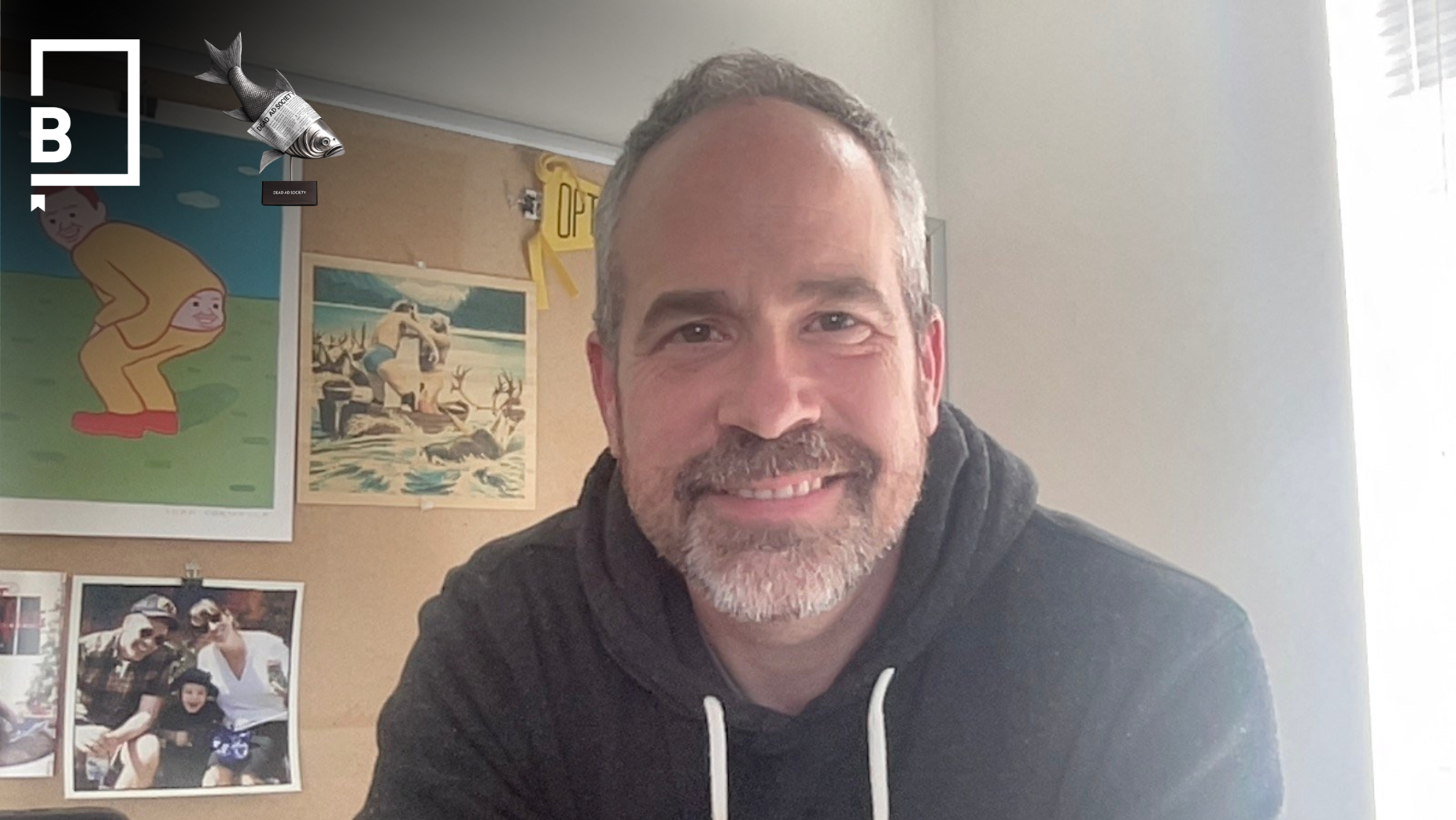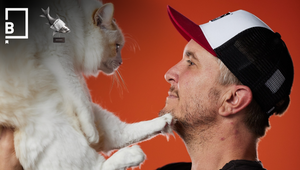
Rejected for Being “Too Funny”: Jon Wolanske on the Idea That Didn’t Make It

Little Black Book is the official media partner of the Dead Ad Society, the hungryman-founded award show that resurrects killed ideas.
Launched in 2024, this revival of hibernating concepts sees entered scripts being performed live by an improv group at the awards show. This year it will take place on September 18th at The Mint in Los Angeles after kicking off in New York City last year. A panel of judges crowns a winner, which is then brought to life by hungryman and a collection of companies – including Work Editorial, Sonic Union, ARC, Synapse and the Screen Actors Guild – that support the show with funding, time and resources. Last year's winning script was recently launched as a finished production for KUL MOCKS, a non-alcoholic beverage brand.
“We called it an anti-award show,” says Caleb Dewart, managing partner of hungryman. “It’s supposed to be wild. The scripts were performed live - a glorified table read. It was messy, imperfect, and that was the point. That’s the heart of it.”
Entries for this year’s show are open until August 15th, 2025 at 4pm PDT.
Little Black Book is catching up with this year’s jurors for honest conversations about the ideas that got away – the ones that died, came back, and the ones that stayed dead.
Jon Wolanske, creative director at Goodby Silverstein & Partners is in the hot seat today. Jon, a former improv performer, is relishing the prospect of judging in front of a live crowd.
Check out previous entries to the interview series here.
LBB> Let's start with the obvious question: Is there an idea you’re still emotionally attached to, even years later?
Jon> There are a few ideas from the grave that continue to make me smile. One in particular that I can’t shake was for a mobile wireless client who wanted to speak to an audience of executives. World travellers. People who are ‘always on’. Our idea was the mobile service was so fast you could get all your work done faster. Our creative director thought it’d be a pretty powerful thing to be seen as a leader in the wireless space by putting out our philosophy of working smarter (not harder) in the form of a business book. A business book about how we work too many hours as a culture, so you should choose a wireless service that lets you work faster, so you can turn off the phone and get to the living part. So a small team of us actually wrote the kind of business book you’d see in a Barnes & Noble or Hudson News. And we designed and printed a few hard back copies for the first presentation. Our clients were impressed by how we showed up in such an unexpected way. But their first piece of feedback was, “Even if we did want to publish a business book, we’re trying to sell our services. Why would we ever publish a book called ‘Off’?”
LBB> What did the death of it teach you about the business? Or about yourself?
Jon> It taught me that the death of an idea is never personal. That took a while for me to learn. That a negative reaction to a piece of work is never because the client doesn’t like you. If the idea doesn’t connect with them or make sense given their immediate goals as a business, it’s probably not moving forward. But ideally, you’re always presenting work that you’re excited to share, that you’d be willing to bring back if it doesn’t survive the first round.
LBB> What do you look for in a dead ad that makes you say, ‘This deserves to live’?
Jon> A great, undeniable, deeply human insight that I haven’t seen spun in this particular way before. Ideally something as unforgettable to me as an audience member or judge as it is for the person or people who came up with it long ago and are clearly still in love with it.
LBB> How are you feeling about judging scripts in real time, in front of a live audience?
Jon> Lucky for me (and to the annoyance of some of my exes), I performed improv for many years. So the idea of a live audience and having to give immediate reactions in front of one doesn’t scare me. If anything, it makes me even more excited to see how these ideas will come to life and expand in that live environment.
LBB> How will you approach judging a script that’s being performed live? Do you think the crowd will sway you?
Jon> I’m not sure the crowd will sway me but I’m surprisingly open to bribes in the form of cold hard cash or homemade baked goods.
LBB> Dead Ad Society is part award show, part séance. What’s your mindset heading into the room?
Jon> As far as the seance part, thankfully, I’m not scared of ghosts. As far as the award show part, I’m sure the talent who will be there and competing will be formidable. And I’m super impressed with and a bit intimidated by my fellow jury members, so it’s all kinda going according to plan. Hopefully, since we’re talking dead ideas, the airing of past grievances will be kept to a minimum. But you never know. This is an industry full of passionate, creatively expressive people, so anything could happen on the night of.
LBB> What’s the most ridiculous reason an idea of yours was killed?
Jon> I once heard a client say an idea we presented was ‘too funny’ and that that was the reason they didn’t like it. It left me speechless. Like, I literally couldn’t form the word sounds needed for the conversation to keep going and my account friends had to jump in.
LBB> What’s your theory on why great ideas often don’t survive the process?
Jon> It’s tempting to say it’s because clients are risk averse. But in a lot of cases in my own experience, I think it more often has to do with their not quite understanding the power of the idea or its potential in terms of how it’s presented. And I don’t just mean a client misunderstanding. Sometimes it’s even the internal team at our reviews. So I’m always wondering how the presentation process can get simpler or more fun or how the creatives can best unscrew their heads and put them on the heads of the people across the room from them.
I was just talking to Jeff Goodby last week about how a few scripts we were presenting were written with terms like ‘cut to’, ‘cut to’, ‘match cut to’, being all over the place, and how they likely were the major thing that made the ideas hard to follow for the clients. So finding ways to share ideas in simpler, more compelling and dramatic ways will always help things and will always be something I’m interested in learning. And hopefully making the process more enjoyable for the audience in the room means they’ll be that much closer to being not dead ideas.
LBB> Outside of this award show, have you ever seen a killed idea come back to life and succeed later?
Jon> I’ve seen ideas get killed by clients a few times only to be resurrected later down the road. Or held on to for future briefs, where they’ve come to life with a few changes to them. Sometimes it’s a matter of bad timing that makes something unsellable in the moment, or just the strong belief of one particular person on the client side who has a passion for the thing. Experiences like that give you an odd feeling of faith that anything is possible.
LBB> Have you ever been the one to kill an idea - and regretted it?
Jon> As a creative director, you have to kill ideas. So, yes. The regret part? Sure. Luckily, my memory for the exact circumstances is about the same as for remembering the rules to card games – you have to remind me each time. In some cases, I’ve seen an idea that I passed on come to life in a spot for a different client from the same creatives and it always makes me smile. In those cases, I send the creative team a Subway Gift Card as congratulations.
LBB> If you had to hold a funeral for a dead idea, what song would play?
Jon> ‘That’s Life’, by Frank Sinatra.
Or maybe the kind of late ‘90s/early 2000s banger you’d find on a ‘Now That’s What I Call Music’ compilation done in an overwrought arrangement by an a Capella group like Pentatonix.















